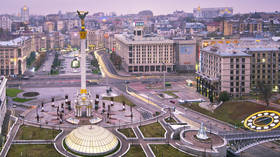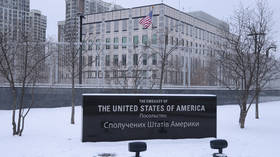US evacuates CIA station
 The American authorities have moved Central Intelligence Agency (CIA) officers away from the Ukrainian capital of Kiev, against the backdrop of a purportedly imminent Russian invasion.
The American authorities have moved Central Intelligence Agency (CIA) officers away from the Ukrainian capital of Kiev, against the backdrop of a purportedly imminent Russian invasion.
The decision, reported on Tuesday by American publication The New York Times, means that CIA personnel will instead be located in Lviv, the largest city in the west of the country, near the border with Poland.
According to the Times, the decision, taken for safety reasons, could put the US in the dark regarding Russian activities in Ukraine, and may hinder the ongoing US mission to harvest intelligence there. In recent times, officers have been working on exposing various alleged Russian plots to overthrow Ukrainian President Volodymyr Zelensky’s government.
The move by the White House to relocate the CIA follows the decision on Monday to also temporarily relocate US diplomats to Lviv. That consulate will continue operating as normal, with a small number of employees remaining in the capital. White House Spokesperson Ned Price refused to disclose the exact figure when asked at a news briefing on Monday.
Monday also saw a recommendation from the US State Department that American nationals leave Belarus and Transnistria, a breakaway region in Moldova. US citizens had already been told to get out of Ukraine.
Yesterday’s announcement of CIA redeployment comes amid fears of an imminent Russian invasion, despite Moscow yesterday beginning the withdrawal of its troops from the Ukraine border, as military drills come to a close. The US viewed the joint combat training as a precursor to a Russian invasion of Ukraine, and considered Russia’s removal of troops to be not “verified.”
RELATED
Enough with the Ukraine war predictions
Ukrainian President Volodymyr Zelensky’s revealing joke about a February 16 invasion, explained.
/cdn.vox-cdn.com/uploads/chorus_image/image/70509521/1369378233.0.jpg)
"The war between Russia and Ukrainewas supposed to start today, or maybe it was yesterday. Actually, the Ukrainian leader says Wednesday.
Or does he?
Monday afternoon, American news outlets startled markets when they reported that Ukrainian President Volodymyr Zelensky said in a video, “We are told that February 16 will be the day of the attack.” His spokesperson later clarified that he had been merely referencing other public media reports, and many journalists noted that Zelensky, a former comedian, was being sarcastic.
The mid-afternoon misunderstanding was the messiest episode in a string of frantic forecasts and much quieter walk-backs, as American and European officials try to surmise the next steps in a possible war — a war that may or may not happen. . ."
Among all the confident predictions being made, it often feels like we’re in a situation where no one knows anything. Everyone’s an expert on when the ground freezes just enough to allow tanks to roll across the Ukrainian border — or maybe the muddiness factordoesn’t matter much anyway. Seasoned analysts are making predictions based on when Putin invaded Ukraine last time (days after the 2014 Winter Olympics in Sochi, Russia) or when he invaded neighboring Georgia (during the 2008 Beijing Olympics). Some prognosticators predicted that Putin would wait until after this year’s Olympics in order to avoid angering Chinese leader Xi Jinping. But on Friday, National Security Adviser Jake Sullivan said, “It may well happen soon,” which is to say, before the Games end.
This isn’t to say that nothing is knowable, just that it’s worth embracing some skepticism.
It’s worth embracing some skepticism
Ten days ago, the Pentagon told reporters that Russia was likely to “produce a very graphic propaganda video, which would include corpses and actors,” as a pretext for war. . .
[ ]
AP diplomatic correspondent Matt Lee, long the haggard cynic in the State Department press corps, was having none of it. In the State Department press briefing, he grilled spokesperson Ned Price about veering into “Alex Jones territory” — that is, conspiracy theory-land — by saying Russia is creating such a video without providing proof.
Price insisted that the very act of him briefing reporters on such intelligence was proof enough, but Lee pushed back. “I remember WMDs in Iraq, and I remember that Kabul was not going to fall. I remember a lot of things. So where is the declassified information other than you coming out here and saying it?” Lee asked.
A week later, Sullivan said, “there is a distinct possibility that Vladimir Putin would order a military action and invasion of Ukraine in this window, in this time period, and that could include the time period before February 20, before the Beijing Olympics have been completed.” Members of the White House press corps channeled Lee in pressing for evidence.
PBS news correspondent Nick Schifrin had gone viral an hour before with a tweet that predicted imminent war. “The US expects the invasion to begin next week, six US and Western officials tell me,” he wrote.
Sullivan partook in the usual verbal acrobatics of deploying many words but not saying a whole lot. “We are in the window when an invasion could begin at any time should Vladimir Putin decide to order it,” he said, but then went on to deny the tweet.
How did we get to a place where there are so many predictions and so little clarity?
READ MORE >> https://www.vox.com/2022/2/14/22933850/ukraine-war-february-16-zelensky-prediction-joke


No comments:
Post a Comment